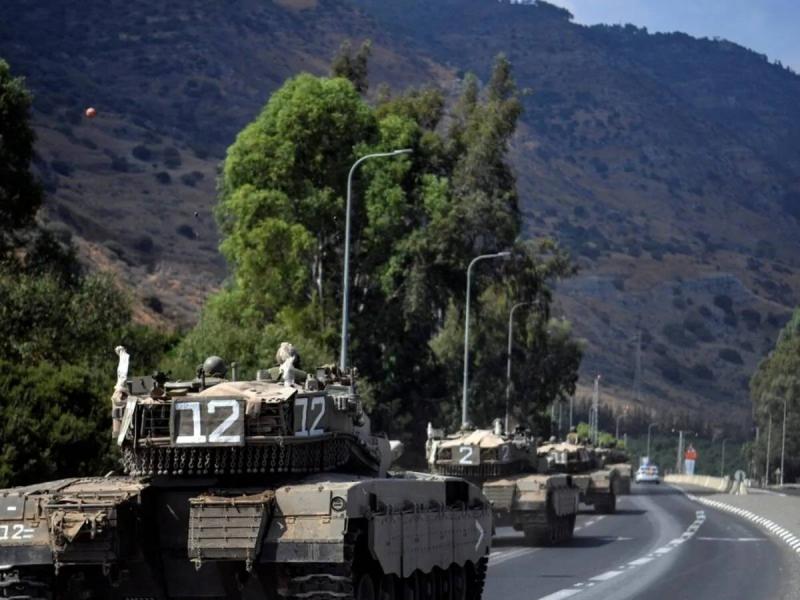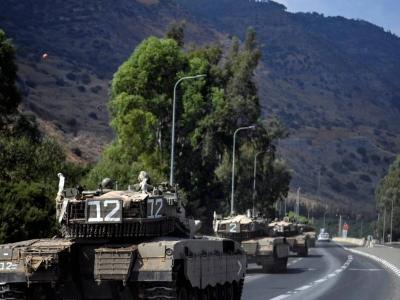The escalating confrontation between Hezbollah and Israel over the past two days has raised fears of the Gaza war expanding into Lebanon, especially following the incident where Hezbollah targeted an Israeli drone with a surface-to-air missile on the Lebanese-Israeli border. This was subsequently followed by the Israeli army's announcement of intercepting a missile fired from Lebanese territory at an Israeli drone.
Since October 8, the Lebanese-Israeli border has witnessed daily reciprocal shelling between the Israeli army and Hezbollah, along with Palestinian factions in Lebanon, resulting in casualties on both sides of the border. The Washington Post notes that the secondary conflict that erupted along the Lebanese-Israeli border in conjunction with the Gaza war is gradually intensifying in scope and intensity. This escalation was evident last Saturday when Israeli jets struck an aluminum factory in the Lebanese town of Nabatieh, located 12 miles north of the border, which exceeds the traditional area considered acceptable for retaliatory fire by both sides.
According to the newspaper, both parties have begun using more lethal weapons. Israel is now regularly sending fighter jets to strike Hezbollah targets, while Hezbollah is deploying drones and heavy-caliber missiles. The Lebanese group announced on Saturday that it had downed an Israeli drone, a claim denied by Israel, which later retaliated by targeting what it described as an advanced ground-to-air missile system.
The newspaper reported that, in a routine manner, every day for the past six weeks, Israel has attacked Lebanon and Hezbollah has attacked Israel; this pattern began as an act of revenge but has now transitioned into a continuous exchange of fire. The strikes are almost always at a distance of 4 to 5 miles from the border on both sides, a deliberate calibration aimed at containing the violence and avoiding a far more destructive war.
However, the newspaper observes that Israeli officials are currently escalating their rhetoric. The Israeli army spokesman, Daniel Hagari, stated last week: "Lebanese citizens will pay the price for this recklessness and for Hezbollah's decision to defend Hamas and ISIS." According to the newspaper, the Israeli army has operational plans to change the security situation in the north.
The newspaper quoted Adeeba Fanash, 65, one of only 12 people remaining in the border village of Dahira on the Israeli border, who noted that in the early weeks of the fighting, Israel only bombed in the evening. She told the Washington Post during her visit to Tyre to purchase supplies: “Now the shelling extends from morning until night and escalates day by day.”
The newspaper indicated that these sporadic escalations have not yet ignited the fire that many fear, but every violation of the unwritten agreement between Hezbollah and Israel brings them closer to the edge of the abyss. Andrea Tenenti, a spokesman for the United Nations Interim Force in Lebanon, noted that as weeks go by and rockets fly, the risk increases that either side may miscalculate or exceed limits, stating, "Anything one side can do might allow the other to decide it has been crossed," leading to a larger conflict.
In the ancient city of Tyre, an attractive coastal city filled with fishermen and cobbled streets, fears are rising that the violence may soon spread to the rest of Lebanon. The past seventeen years have granted the south its longest period of peace in five decades, allowing the city to flourish and attract tourists to its beaches, bars, and luxury hotels. However, the Washington Post reported that the bars and hotels are now empty, and there are few customers in the restaurants.
Arab and Western diplomats told the newspaper that intense behind-the-scenes talks are underway to prevent a repeat of the events of 2006. Their attention has focused on the calculations of Hezbollah and the words of Hassan Nasrallah, the powerful leader of the group with longstanding ties to Iran.
The National Interest magazine mentioned that the United States is trying to mediate between the two sides to avert this nightmarish scenario, aiming to minimize the likelihood of a regional war and using all its influence to achieve this. The magazine explains that people in Lebanon are attempting to carry on with their daily lives amid a constant state of fear, as the situation in the southern border region worsens, but the ongoing fighting between Hezbollah and Israel keeps everyone on alert for a large-scale war.
They see the prospect of Israeli airstrikes on Beirut and accurately guided Hezbollah missiles targeting Tel Aviv as unavoidable. Some in Lebanon have suggested ways to avoid a full confrontation with Israel. General Abbas Ibrahim, who served as the head of Lebanon's General Directorate of General Security, spoke with the National Interest about the current situation, stating, "The United States is making both formal and informal contacts with people they believe can make a difference with Hezbollah because the Americans are trying to reduce tension along the border."
According to the magazine, General Ibrahim has previously played the role of intermediary for Hezbollah and the United States whenever they needed to communicate. However, he firmly denied any direct discussion between them regarding the current conflict, stating, "I can say that Hezbollah is not engaged in direct talks with the United States. They are focusing all their efforts on Palestine. There have been many attempts to build this channel between Hezbollah and the United States, but they have so far proven unsuccessful." He added that the best guarantee against the war invading Lebanon is to stop the Israeli attack on Gaza immediately.




